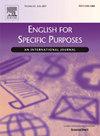The value of interactional metadiscourse in university level writing: Differences between high and low performing undergraduate business students
IF 2.7
1区 文学
Q1 LINGUISTICS
引用次数: 0
Abstract
This study investigates the use of interactional metadiscourse within a third-year Human Resources course at a large North American university. Analysing final individual writing assignments, higher-performing (grades 80 and above) and lower-performing (grades 74 and below) students were compared in terms of how they differ in their use of interactional metadiscourse. The Authorial Voice Analyzer (Yoon, 2017) was employed to extract interactional metadiscourse features, including hedges, boosters, attitude markers, self-mentions, and engagement markers. Intergroup differences were then assessed using Cohen's d. Key findings include higher-performing students employing a greater variety of hedge types and using self-mentions more frequently, while lower-performing students relied more heavily on reader engagement markers, particularly by way of reader pronouns. These results suggest that higher-graded students in business courses may be more adept at managing interactional metadiscourse to present an appropriate authorial stance, while lower-graded students tend to over-engage with the reader. Pedagogical implications include the need for writing instructors to focus on teaching students how to strategically employ hedges and self-mentions to improve the quality and authority of their writing in business-related disciplines. These insights can help shape targeted writing interventions aimed at improving student performance in content-focused courses, such as Human Resources.
互动元语篇在大学写作中的价值:高、低成绩商科学生的差异
本研究调查了北美一所大型大学三年级人力资源课程中互动元话语的使用情况。通过分析期末个人写作作业,比较了表现较好的学生(80分及以上)和表现较差的学生(74分及以下)在使用互动元话语方面的差异。作者语音分析器(Yoon, 2017)被用来提取交互元话语特征,包括模糊限制语、助推器、态度标记、自我提及和参与标记。然后使用科恩的d来评估组间差异。主要发现包括,表现较好的学生使用更多种类的限制语类型,更频繁地使用自我提及,而表现较差的学生更多地依赖于读者参与标记,特别是通过读者代词的方式。这些结果表明,在商科课程中,成绩较高的学生可能更善于管理互动元话语,以呈现适当的作者立场,而成绩较低的学生往往与读者过度互动。教学意义包括写作教师需要专注于教学生如何有策略地使用模糊限制语和自我提及,以提高他们在商业相关学科中的写作质量和权威性。这些见解可以帮助形成有针对性的写作干预措施,旨在提高学生在以内容为中心的课程中的表现,比如人力资源。
本文章由计算机程序翻译,如有差异,请以英文原文为准。
求助全文
约1分钟内获得全文
求助全文
来源期刊

English for Specific Purposes
LINGUISTICS-
CiteScore
5.70
自引率
8.00%
发文量
41
审稿时长
62 days
期刊介绍:
English For Specific Purposes is an international peer-reviewed journal that welcomes submissions from across the world. Authors are encouraged to submit articles and research/discussion notes on topics relevant to the teaching and learning of discourse for specific communities: academic, occupational, or otherwise specialized. Topics such as the following may be treated from the perspective of English for specific purposes: second language acquisition in specialized contexts, needs assessment, curriculum development and evaluation, materials preparation, discourse analysis, descriptions of specialized varieties of English.
 求助内容:
求助内容: 应助结果提醒方式:
应助结果提醒方式:


